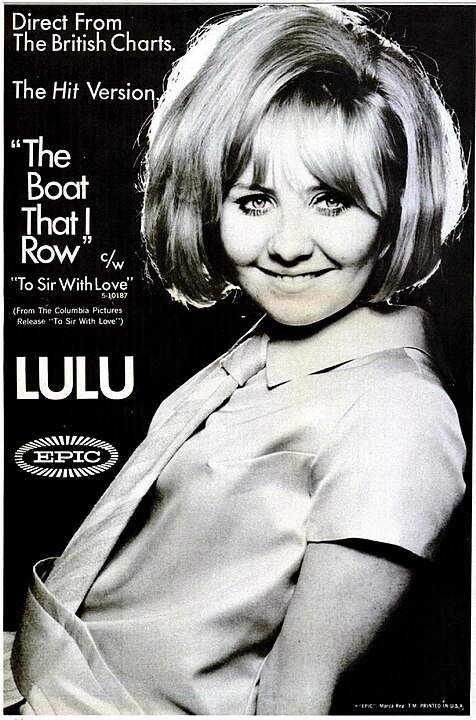Who is Lulu?
Lulu is a Scottish singer best known for her international hit “To Sir With Love” in the 1960s. The Glasgow-born Lulu started her professional career when she was still in her teens; her first hit single is her cover of the Isley Brothers’ “Shout.” She went on with a string of other homegrown hits such as “Leave A Little Love,” “The Boat That I Row,” and “Let’s Pretend.” Lulu would then score the biggest hit of her career, especially over in North America, with the song “To Sir with Love” (a theme soundtrack to the film of the same title). In Europe, her song “Boom Bang-a-Bang” became a winning entry in the Eurovision Song Contest in 1969. She has continued to record, tour and appear in movies and television in the UK.
Early career and stardom in her native Britain
Marie McDonald McLaughlin Lawrie, aka Lulu, was born in Glasgow, Scotland on November 3, 1948. Lulu was raised in an adoptive family. Nowadays she’s also known as Lulu Kennedy-Cairns, which is actually her late biological mother’s name. She started her musical pursuit when she was in her teens, by performing with a local band the Bellrocks.
Already, Lulu’s mature-sounding voice belied her tender age, and when she was only fifteen years old she did a raucous, self-assured rendition of the Isley Brothers’ “Shout,” which went to the UK top ten at #7.
Lulu had become a star by then in her native country, as well in many parts of Europe. So popular in fact, that she even got to tour in the then-communist Poland (along with the Hollies). She was also under the wings of famed producer Mickie Most, who also helmed the recordings of The Animals, Donovan, and later Hot Chocolate and Jeff Beck Group, among others.
In the UK, Lulu raked in many hit singles such as “Leave a Little Love” (at #8), “Try to Understand” (at #25), and the Neil Diamond-penned “The Boat That I Row” (at #6) which occurred in the mid-1960s. But she had yet to score a major hit outside Europe.
Worldwide smash hit with “To Sir with Love”
In 1967, Lulu starred in her first movie To Sir, with Love. Filmed and produced in Britain, it starred Oscar-winning American actor Sidney Poitier as a schoolteacher, and Lulu was cast as one of his students. She also sang the film’s title track, which was released as a single on Epic label.
“To Sir with Love” (which was written by Don Thomas and Mark London) at last gave Lulu a major hit in the US, topping the Billboard Hot 100. It also went to #9 on the R&B singles chart. It sold over a million copies and went gold. The B-side for “To Sir with Love” was “Let’s Pretend” which went to #11 on the UK singles chart.
Lulu on the Eurovision Song Contest
Although she didn’t quite match the success of “To Sir with Love,” Lulu still made some presence on the US charts particularly via the Top 40 hits “Best of Both Worlds” (#32 pop) and “Oh Me, Oh My (I’m a Fool for You Baby)” (#22 pop).
Lulu continued to be successful and popular in her native country; appearing regularly on national television only added to her resume. In 1968, Lulu hosted her own TV variety show series. The following year she represented the United Kingdom at the Eurovision Song Contest. Her final entry was “Boom Bang-a-Bang,” written by Alan Moorhouse and Peter Warne. Lulu made no secret in disliking the song, but it went on to win the Eurovision contest (along with joint winners from Spain, Netherlands and France), and shoot up to #2 on the UK single chart.
Later career
Over the years Lulu’s run on the charts had begun to ebb but even then she still managed to be active and visible. She continued to appear on television and even hosted a long-running radio program. Lulu even entered into an unlikely musical partnership with David Bowie who co-produced her cover versions of his own songs, “The Man Who Sold the World” (a #3 UK hit in 1969) and “Watch That Man.”
In 1981, Lulu entered into the US Top 20 charts once more with “I Could Never Miss You (More Than I Do)” which went to #18. She followed this up with a more modest hit later that year with “If I Were You” (#44 pop). In 1993, she had her last top 20 UK hit with “Independence” which also reached #3 on the US dance singles chart.
The new millennium saw Lulu in a number of changes. She was made a member Order of the British Empire (OBE) by Queen Elizabeth II in 2000. In 2002, she published her autobiography “I Don’t Want To Fight,” and two years later she released the critically-acclaimed Back on Track studio album. Her last full-length work to date was 2009’s Lulu on the Dancefloor: Remixes. She has continued to appear on television.

